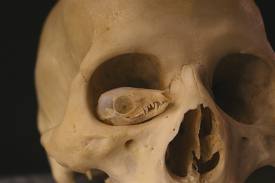EMERGING FRONTIERS IN RESEARCH AND INNOVATION (EFRI): Chromatin and Epigenetic Engineering (CEE) and Continuum, Compliant, and Configurable Soft Robotics Engineering (C3 SoRo)
The Emerging Frontiers in Research and Innovation (EFRI) program of the NSF Directorate for Engineering (ENG) serves a critical role in helping ENG focus on important emerging areas in a timely manner.
This solicitation is a funding opportunity for interdisciplinary teams of researchers to embark on rapidly advancing frontiers of fundamental engineering research.
For this solicitation, we will consider proposals that aim to investigate emerging frontiers in the following two research areas:
<ul> <li>Chromatin and Epigenetic Engineering (CEE)</li> <li>Continuum, Compliant, and Configurable Soft Robotics Engineering(C3 SoRo) </li> </ul> This solicitationwill becoordinated with the Directorate for Biological Sciences (BIO) andthe Directorate for Computer and Information Science and Engineering (CISE).
EFRI seeks proposals with transformative ideas that represent an opportunity for a significant shift in fundamental engineering knowledge with a strong potential for long term impact on national needs or a grand challenge.
The proposals must also meet the detailed requirements delineated in this solicitation.
INFORMATIONAL WEBCAST:
The Emerging Frontiers and Multidisciplinary Activities (EFMA) Office will host an informationalwebinar onSeptember 7th, 2017 at 1:00 PM ESTto discuss the EFRI program and answer questions aboutthe FY 2018 solicitation.
Details on how to join this webinar will be posted on the<a href="https://www.nsf.gov/div/index.jsp?div=EFMA">EFMA Website</a>.
This solicitation is a funding opportunity for interdisciplinary teams of researchers to embark on rapidly advancing frontiers of fundamental engineering research.
For this solicitation, we will consider proposals that aim to investigate emerging frontiers in the following two research areas:
<ul> <li>Chromatin and Epigenetic Engineering (CEE)</li> <li>Continuum, Compliant, and Configurable Soft Robotics Engineering(C3 SoRo) </li> </ul> This solicitationwill becoordinated with the Directorate for Biological Sciences (BIO) andthe Directorate for Computer and Information Science and Engineering (CISE).
EFRI seeks proposals with transformative ideas that represent an opportunity for a significant shift in fundamental engineering knowledge with a strong potential for long term impact on national needs or a grand challenge.
The proposals must also meet the detailed requirements delineated in this solicitation.
INFORMATIONAL WEBCAST:
The Emerging Frontiers and Multidisciplinary Activities (EFMA) Office will host an informationalwebinar onSeptember 7th, 2017 at 1:00 PM ESTto discuss the EFRI program and answer questions aboutthe FY 2018 solicitation.
Details on how to join this webinar will be posted on the<a href="https://www.nsf.gov/div/index.jsp?div=EFMA">EFMA Website</a>.
Obtain Full Opportunity Text:
NSF Publication 17-578
Additional Information of Eligibility:
*Who May Submit Proposals: Proposals may only be submitted by the following: -Universities and Colleges - Universities and two- and four-year colleges (including community colleges) accredited in, and having a campus located in, the US acting on behalf of their faculty members.
Such organizations also are referred to as academic institutions.
*Who May Serve as PI: <span style="color: black; font-family: 'Calibri',sans-serif; font-size: 11pt; mso-ascii-theme-font: minor-latin; mso-hansi-theme-font: minor-latin;"><!--?xml:namespace prefix = "o" ns = "urn:schemas-microsoft-com:office:office" /--></span> The lead Principal Investigator (PI) must be full-time, tenured or tenure-track faculty as determined by the submitting organization.
A minimum of one PI and two co-PIs must participate.
At least one member of the project team (PI or co-PI) must have a full-time, tenured or tenure-track faculty appointment within a College/Department of Engineering.
Full Opportunity Web Address:
Contact:
Agency Email Description:
Agency Email:
grantsgovsupport@nsf.gov
Date Posted:
2017-07-18
Application Due Date:
2018-02-23
Archive Date:
2018-03-25
Social Entrepreneurship
Spotlight
When it Comes to Social Enterprises, Failure is the Best Platform for Innovation

In the world of social enterprises, failure is a cringe-worthy moment nobody wants to talk about. But, social entrepreneurs can benefit from their failures.

